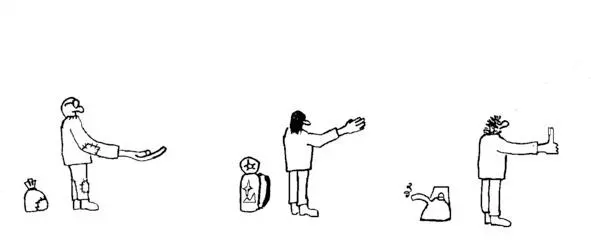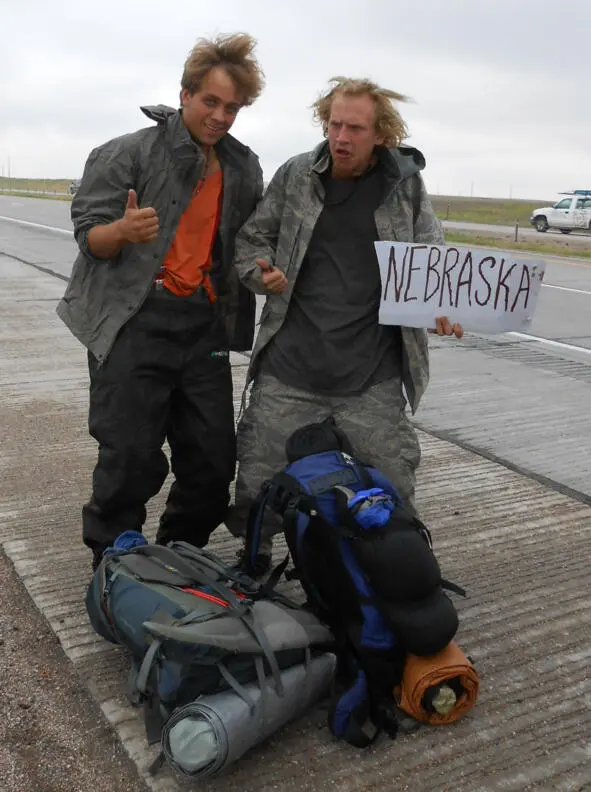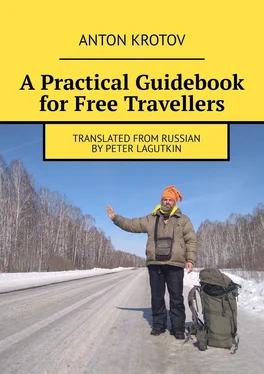Many European countries prohibit hitch-hiking on expressways. Go to a petrol station or toll booth and wait for a car; or talk directly with the drivers. This practice does not apply in ex-USSR because there are (almost) no proper expressways yet.
If you hitch-hike at night and don’t have a torch, you need a well-lit spot. In dark clothes and with no lights around, you might not be run over by a car, but won’t achieve hitch-hiking success either.
Waving down a car involves more than just standing there thumbing it until you get your lift – what it really is is a sequence of exchanges between the hitch-hiker and the passing drivers, using gestures only. First of all, concentrate on one vehicle in the traffic, even if you alone know you’re doing it, and address that particular driver. Look the driver in the face – don’t look at your boots or your handkerchief.
You have several gestures to choose from: 1) arm extended parallel to the road, thumb sticking out – common in Europe and vigorously promulgated by Valery Shanin in Russia; 2) arm bent, open palm facing the traffic (this is how long-distance lorry drivers greet each other on the road); 3) arm simply extended parallel to the road, «blocking» it like a boom barrier.
But it isn’t what gesture you make that matters; what matters is, it must be done vigorously and appeal specifically to the driver you’re addressing. It must look compelling and not like begging (as if whining, «pick me up, ple-e-a-a-se!»).

Beggar gesturing; Traveller gesturing; Western Traveller gesturing
Make whatever gesture you like. But avoid half-facing or not facing the driver. Never raise your hand thinking something like, «oh boy, this one won’t stop, I don’t know why I’m doing it.» Don’t let your mind wander: do it with belief you’ll succeed. If you don’t believe you’ll succeed, better let a vehicle or two pass, and eat a candy.
Don’t freeze with your hand raised – don’t try to blend in with the other lamp-posts in the landscape (that’ll soon make your shoulder tired, too).
Many drivers don’t stop but try to justify their behaviour in gestures. Some will draw a line across their throat, indicating that the car is so full you won’t fit in. Some will point their finger sideways, showing they’re about to take a turn. Others still will make more gestures to the effect that, you know, would love to pick you up, mate, but, sorry, can’t do it, mate, not me! Finally, no reaction from the driver means that the hitch-hiker is doing something wrong.
There are ways to urge the driver to change his mind. If he cites not enough space, show with your hands you’ll make yourself small. If the driver indicates he’s about to turn, you can point in the same direction and nod (maybe your current spot is bad and you want to escape anywhere, even if it’s until the next junction) – or gesture that you want to be taken far. If you can tell by the number plates where the vehicle hails from and that’s also your destination, point to the plates. If you see the cargo area’s empty, indicate you want to get in there, etc. – so, do all you can fit in those five to seven seconds that you have to communicate with the driver. And if he doesn’t pull over anyway, don’t be upset, stay where you are and pick up another vehicle. At first, only one vehicle in thirty or fifty will stop for you – but that doesn’t mean hitch-hiking doesn’t work, it means your skills have room for improvement.
Don’t wave down cars while walking,because when you walk, you are facing forward, and when a car appears, it does so from behind, and it’s uncomfortable to wave to it facing backward – you’ll end up turning back and forward all the time. So, if you choose to walk, walk, if you choose to stand and wait, stand and wait (and don’t forget to wave), but doing both is not productive. Most of the time, your destination will be hard to reach by walking and you will hardly at all gain by trying.
With considerable traffic present (say, three or four vehicles every minute), quickly occupy a decent spot, don’t waste time and start waving. When the traffic is lighter (say, one in five minutes), choose the spot more carefully and get ready to become a fixture. Of course, when the traffic is close to zero (like one in an hour) and a curve or an inhabited locality lies ahead (along with the possibility of more vehicles), then walk, pricking your ears for surprises coming from behind.
Signs.Some Europeans use signs with the destination written on them. Don’t do it in Russia. Remember that: 1) a sign is worth less than a good spot, because nobody will bother reading it while driving fast; and 2) if you wave a sign mentioning Irkutsk or some other faraway locality, you will «filter out» vehicles headed to closer destinations which might turn out very quick and useful. Hitch-hiking sages almost never use signs.

Western hitchhikers
How long will a typical wait take?
There is no fit-all answer. Waiting time depends on your experience, equipment, spot quality, traffic, time of the day, season, region, country… and some randomness thrown in. Experienced hitch-hikers have got stuck for two or three hours in the daytime, at good spots; beginners have escaped from bad spots quickly. Don’t think about waiting time; thing about average speed. It is quite predictable and should be about 600 or 700km (370—440mi) per twelve hours spent on a well-paved highway in Russia.
To get the car to stop is just half the work; what remains to be done is to get it moving with you inside – and make the driver happy with his decision. Many beginners want to know: what to say to the driver? Here is one option:
«Good morning, can you give me a lift down this road?»
You will usually hear: «Get in» – or: «Where you wanna go?» I usually name my final destination: «Well actually I want to go to Moscow, but any place in that direction is okay.» The faraway place you name usually arouses interest and can become the subject of your conversation. Or you can say: «Could you take me some distance in the direction of Moscow?» The driver will drawl, expressing doubt: «To Moscow? I’m only going to Tuymazy» – or refer to any other obscure, nearby locality. You accept, and the conversation goes on with more incredulous drawling: «Moscow? Ain’t that takin’ you, like, forever?» – and so on.
If I know that the nearest good spot is ahead of the city N, I say:
«Good morning, could you give me a lift to the city N?»
When you are in a city, or in the Caucasus, or in Central Asia, or in some foreign countries, or anywhere else where you worry the driver might be a cabby in disguise (which is how we call those who ask for money after giving you a lift), you say:
«Good morning! Could you give me a lift down the road? I’ve nothing to pay with.»
Or, after finding out where the driver is headed, say:
«Can I go with you? No money!» (Or: «For free!»)
And they will say, with a funny accent: «What money, schmoney, what’re you talking about! Get right in, my friend!»
Or you can say: «Good morning! Are you headed straight? Can I go with you? – I’m a hitch-hiker!» – or: «Good morning! Could you take a hitch-hiker in the direction of Chernyshevsk?»
Читать дальше














